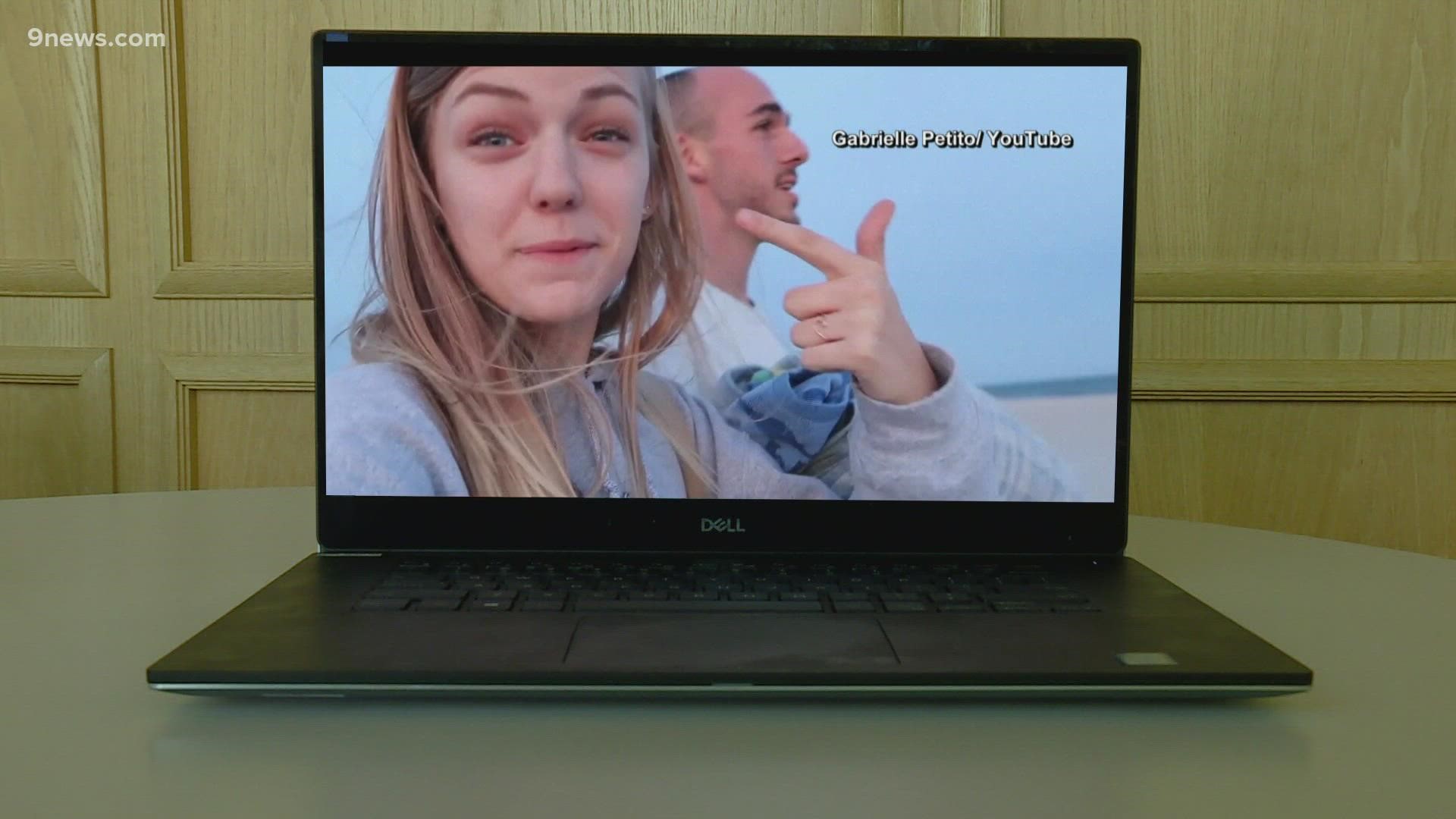DENVER — While police continue to investigate what exactly happened to Gabby Petito, domestic violence groups are hoping an incident before she disappeared will help spark a conversation about potential signs of abuse.
Petito was reported missing in early September by her family. A few months prior, she embarked on a road trip with her boyfriend, Brian Laundrie.
A month before Petito went missing, she and Laundrie were involved in a domestic disturbance in Moab, Utah. Police just released a 911 call from that day that indicated Laundrie as the one who was causing harm, but the body camera paints Petito as the aggressor, and that's how police treated it.
9NEWS spoke to SafeHouse Denver domestic violence advocate Natasha Adler. While Adler can't speak on any specific case, including Petito's, she can speak about how a perception of abuse can have a major impact.
(Editor’s note: This interview has been edited for context and clarity.)
9NEWS: What can domestic violence look like?
Adler: Domestic violence cases are not always overt. A lot of folks may think domestic violence may look like hitting, punching, bruises on the face, things that we can see. Many times, the most intense and damaging forms of intimate partner damage happen behind closed doors: emotional abuse, verbal abuse, stalking, monitoring, things like that. Those aren’t things we can necessarily pinpoint or prove, and so that can be really difficult when determining if this is a legitimate domestic violence case.
There’s also a lot of stigma around folks that don’t know a lot about domestic violence. It's supposed to look this way, and if it doesn’t fit into this box, then we need another word for it because it's not abuse, but that’s not always the case. In fact, it's most often it’s not.
What are some signs of domestic violence?
Adler: If your loved one slowly starts to withdraw, won’t come to family functions, communicates with you less and less. Sometimes they will overtly say "My partner doesn’t like me to spend time with my family or my friends." That can be a red flag, any of those power and control behaviors. Other controlling behaviors like forcing folks to work without contributing, having the financial burden be all on them, those can be things to look out for.
If there’s a general lack of trust in the relationship, too--jealousy, accusations of cheating, monitoring social media, things like that, those can definitely be a red flag. There’s a fine line between unhealthy behaviors such as simple jealousy and taking those behaviors to an abusive level.
How can you talk to a loved one if you fear they are being abused?
Adler: A lot of survivors do know when they’re in an abusive relationship. Other times they are gaslit by their partner and say "No, this is normal. This is what love looks like."
It’s appropriate for a loved one to approach their other loved one and say, "Yes, I am worried about you." What I would think is most important to include is to come from an empowerment-based approach. This person is in a power and control relationship. They are with somebody that doesn’t let them have a voice, so really taking the time to say "Yes, I am worried," but also giving them space to share their story and support them where they’re at.
It can be a lot of pressure for you as a loved one to say, "You need to leave. This guy is bad for you," or "This partner is bad for you" that can add an entire layer of stress and may cause the survivor to internalize even more, and then you lose that open communication, so listening and just giving them the power back as much as you possibly can be more powerful than you know.
Can both partners in a relationship be guilty of domestic violence?
Adler: There are a lot of instances where violence will be used by someone that isn’t the primary aggressor or another term for abuser. So, for example, maybe the abuser will block the survivor into a room and the survivor slaps him or her to get out of the room. That can be mutual violence. However, there is usually a primary aggressor. It just may not always be clear, and that’s where it can really get tricky when it comes to arrests and just perception of what’s actually going on in that relationship.
If police respond to a domestic violence situation but no one is arrested, is it still important to take those incidents seriously?
Adler: Yes, absolutely. I don’t pretend that is cut and dry for most officers or any sort of first responder, but that is an opportunity to reach out and an opportunity to have a conversation of what those folks need in that moment, to meet them where they’re at.
Denver has a domestic violence prevention team, and their detectives go out and do a lot of that intervention without arrest, without full-blown disturbances, just to get those resources out in the community.
Safehouse Denver has a 24-hour hotline that can connect a survivor with a wide array of resources. That hotline can be reached at (303) 318-9989.
SUGGESTED VIDEOS: Latest from 9NEWS

